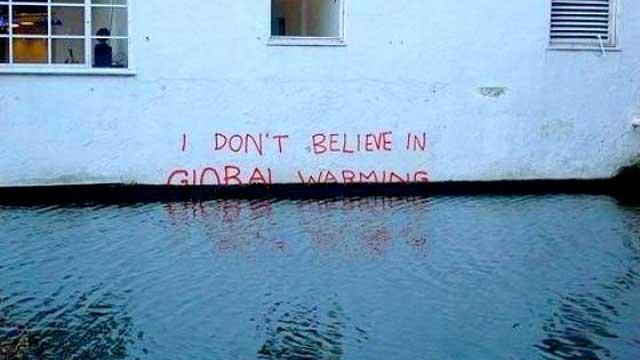
Humankind's greatest crisis coincides with the rise of an ideology that makes it impossible to address. By the late 1980s, when it became clear that manmade climate change endangered the living planet and its people, the world was in the grip of an extreme political doctrine, whose tenets forbid the kind of intervention required to arrest it.
Neoliberalism, also known as market fundamentalism or laissez-faire economics, purports to liberate the market from political interference. The state, it asserts, should do little but defend the realm, protect private property and remove barriers to business. In practice it looks nothing like this. What neoliberal theorists call shrinking the state looks more like shrinking democracy: reducing the means by which citizens can restrain the power of the elite. What they call "the market" looks more like the interests of corporations and the ultra-rich. Neoliberalism appears to be little more than a justification for plutocracy.
The doctrine was first applied in Chile in 1973, as former students of the University of Chicago, schooled in Milton Friedman's extreme prescriptions and funded by the CIA, worked alongside General Pinochet to impose a programme that would have been impossible in a democratic state. The result was an economic catastrophe, but one in which the rich - who took over Chile's privatised industries and unprotected natural resources - prospered exceedingly.
The creed was taken up by Margaret Thatcher and Ronald Reagan. It was forced upon the poor world by the IMF and the World Bank. By the time James Hansen presented the first detailed attempt to model future temperature rises to the U.S. Senate in 1988, the doctrine was being implanted everywhere.
As we saw in 2007 and 2008 (when neoliberal governments were forced to abandon their principles to bail out the banks), there could scarcely be a worse set of circumstances for addressing a crisis of any kind. Until it has no choice, the self-hating state will not intervene, however acute the crisis or grave the consequences. Neoliberalism protects the interests of the elite against all comers.
Preventing climate breakdown - the four, five or six degrees of warming now predicted for this century by green extremists like, er, the World Bank, the International Energy Agency and PriceWaterhouseCoopers - means confronting the oil, gas and coal industry. It means forcing that industry to abandon the four-fifths or more of fossil fuel reserves that we cannot afford to burn. It means cancelling the prospecting and development of new reserves - what's the point if we can't use current stocks? - and reversing the expansion of any infrastructure (such as airports) that cannot be run without them.
But the self-hating state cannot act. Captured by interests that democracy is supposed to restrain, it can only sit on the road, ears pricked and whiskers twitching, as the truck thunders towards it. Confrontation is forbidden, action is a mortal sin. You may, perhaps, disperse some money for new energy; you may not legislate against the old.
So Barack Obama pursues what he calls an "all of the above" policy: promoting wind, solar, oil and gas. Ed Davey, the British climate change secretary, launched an energy bill in the Commons last week whose purpose was to decarbonise the energy supply. In the same debate he promised that he would "maximize the potential" of oil and gas production in the North Sea and other offshore fields.
Lord Stern described climate change as "the greatest and widest-ranging market failure ever seen." The useless Earth Summit in June; the feeble measures now being debated in Doha; the energy bill and electricity demand reduction paper launched in Britain last week (better than they might have been but unmatched to the scale of the problem) expose the greatest and widest ranging failure of market fundamentalism: its incapacity to address our existential crisis.
The 1,000-year legacy of current carbon emissions is long enough to smash anything resembling human civilization into splinters. Complex societies have sometimes survived the rise and fall of empires, plagues, wars and famines. They won't survive six degrees of climate change, sustained for a millennium. In return for 150 years of explosive consumption, much of which does nothing to advance human welfare, we are atomizing the natural world and the human systems that depend on it.
The climate summit (or foothill) in Doha and the sound and fury of the British government's new measures probe the current limits of political action. Go further and you break your covenant with power, a covenant both disguised and validated by the neoliberal creed.
Neoliberalism is not the root of the problem: it is the ideology used, often retrospectively, to justify a global grab of power, public assets and natural resources by an unrestrained elite. But the problem cannot be addressed until the doctrine is challenged by effective political alternatives.
In other words, the struggle against climate change - and all the crises which now beset both human beings and the natural world - cannot be won without a wider political fight: a democratic mobilization against plutocracy. I believe this should start with an effort to reform campaign finance: the means by which corporations and the very rich buy policies and politicians. Some of us will be launching a petition in the UK in the next few weeks, and I hope you will sign it.
But this is scarcely a beginning. We must start to articulate a new politics: one that sees intervention as legitimate, that contains a higher purpose than corporate emancipation disguised as market freedom, that puts the survival of people and the living world above the survival of a few favored industries. In other words, a politics that belongs to us, not just the super-rich.
3 WAYS TO SHOW YOUR SUPPORT
- Log in to post comments













